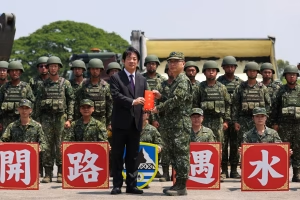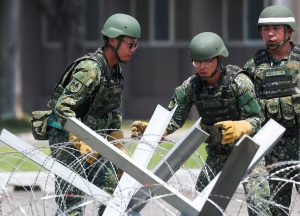In a major show of military readiness, Taiwan’s armed forces conducted their first-ever live-fire test of U.S.-made HIMARS rocket systems this month, underscoring the island’s growing efforts to bolster its defences amid rising tensions with China.
The test, held at a secluded military base in southern Pingtung County, involved the launch of 33 rockets into the Pacific Ocean, pointed away from the Chinese mainland but loud enough to send a message. The High Mobility Artillery Rocket System (HIMARS), manufactured by U.S. defence giant Lockheed Martin, can strike targets up to 185 miles away, far enough to hit China’s Fujian province across the Taiwan Strait.
Though the country did not disclose the exact test location, military officers confirmed the exercise was successful and marked a historic milestone in the island’s modernisation push.
The launch follows increased Chinese military pressure on the self-governing democracy, which Beijing claims as its territory. Over the past year, China has ramped up large-scale drills, including recent amphibious landing exercises, and continues near-daily incursions by aircraft and naval forces.
HIMARS, which has proven pivotal in Ukraine’s war against Russia, is now viewed as a central piece of the East Asia country’s asymmetric defence strategy. While Ukraine received the rocket systems through U.S. aid, Taiwan purchased them at a cost of over $1 billion. Eleven of the 29 launchers have already arrived; the rest are expected next year, ahead of schedule.
“We take this matter very seriously,” said Sun Li-fang, spokesperson for Taiwan’s National Defence Ministry. “Ensuring Taiwan’s security is our responsibility and our top priority.”
The East Asia country’s military remains vastly outnumbered, China has 2.8 million active-duty personnel compared to 160,000 of the East Asia nation. To narrow that gap, Taipei has extended mandatory military service to one year, increased annual reservist training, and committed to raising defence spending above 3% of GDP.
Taiwan deepening cooperation with US
In addition to HIMARS, Taiwan is deepening cooperation with the U.S. through arms deals, drone development, and an unprecedented intelligence-sharing arrangement. Sun described this exchange as a “game-changer,” giving Taiwan vital insights into Chinese military activity.
“We typically don’t go into detail because intelligence and information sharing are sensitive,” he said. “But it’s extremely helpful in making appropriate defensive deployments.”
This cooperation, however, comes against a backdrop of uncertainty. The U.S. maintains a policy of “strategic ambiguity” on whether it would militarily defend Taiwan in a Chinese invasion. Comments from President Donald Trump have also raised eyebrows in Taipei, accusing Taiwan of “stealing” chip business and not paying enough for defence, while pushing new tariffs on Taiwanese exports.





